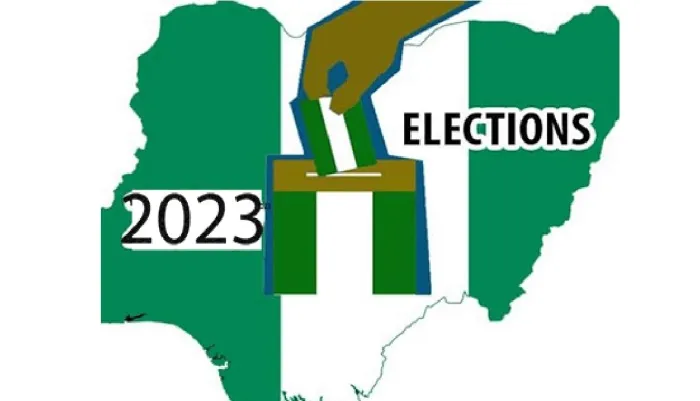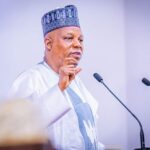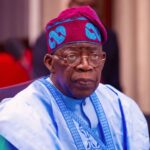It was in December 2022 that I first saw the chilling video of the then-APC presidential candidate, Bola Ahmed Tinubu, explaining his political philosophy.
“Political power is not going to be served in a restaurant…not served in (sic) a la carte,” he says to what appears to be an inner political circle. “It is what we are doing. It is being determined to do it at all cost. Fight for it, grab it, snatch it, and run with it….”
“Grab it, snatch it, run with it” as a political principle?
The first image that came to my mind as I heard that was from the early PDP days in 1999 and 2003: thugs arriving at a polling unit in the heat of an election and executing the physical snatch-and-run manoeuvre. I remember rigging activities involving the stuffing of ballot boxes in homes that were then substituted for the legal boxes between the polling unit and the collation centre.
- Tinubu Will Not Abandon Outgoing Northern APC Govs – Onanuga
- Why my artworks focus on women – Jekein Lato-Unah
But what the APC National leader and now presidential candidate was saying was far more insidious. It was at once a revelation of ruthlessness of character and declaration of impunity: clarification that every mechanism that yields electoral victory is not just passable but welcome.
For a democracy, it is the very definition of hell. But as scary as the declaration may have sounded three months ago, in the presidential contest on February 25 but even more so in the state elections on March 18, the full reach of Tinubu’s words became frighteningly clear. That explains why ethnic baiting and brigandage were so openly and cold-bloodedly deployed in Lagos State following his defeat there.
Evidently seething that he was embarrassed on his own turf, Mr Tinubu has no apologies about the widespread intimidation, ethnic division and suppression that was put in play. He has expressed none that Lagos, Nigeria’s most cosmopolitan state, suddenly became its most parochial and dangerous to ensure that his APC won. Instead, he is asking the security agencies to stop the Labour Party presidential candidate, Mr Peter Obi, from trying to “delegitimise and discredit” his victory.
He accuses Mr Obi of “going around inflaming passions, spreading lies as if he is still campaigning for the highest office in the land, weeks after the exercise was concluded and a winner announced.”
And he has a message for the National Broadcasting Commission (NBC) that is a finger in the eye of free speech, asking the agency “to caution TV houses giving Obi the platform to de-legitimise a free and fair election, when he has taken his case to court.”
Only in a scorched earth, “Grab it, snatch it, run with it” world does this appear to make sense. Nothing was “free and fair” in the elections. The law was breached. Guidelines were breached. People were disenfranchised. Vote collation, recording and transmission were compromised. The electoral commission failed.
This is why the so-called election is now in court, and why, properly-speaking, there is as yet no such thing as a “president-elect”: that normally emerges when the defeated opponent concedes or the judiciary pronounces on the matter.
In other words, any lies being spread right now are on the part of anyone claiming to have “won” a contest that is in dispute. That is mere propaganda and wishful thinking: a victory in the drab colours of defeat is why the streets of Nigeria are wearing the appearance of a funeral. Nothing has been concluded.
Last Tuesday, President Muhammadu, who should have been apologising for his election mess, hosted Mary Beth Leonard, the outgoing US Ambassador, telling her a fable of elections that are proof “voter vibrancy and maturity” in Nigeria.
“People are realizing their power,” he said, adding, “Given the chance of a free and fair vote, nobody can tell [Nigerians] what to do.” Sadly, the irony of his own words was lost on him.
He told the ambassador that he was “inspired by the fact that voters were able to make their own decision, to decide who won and who lost,” sounding as though voter power and purpose is not the very objective.
It was striking that Ms. Leonard refused to accept the bait and provide Aso Rock with its desired validation of the shameful process. Instead, she spoke about such issues as progress made in Nigeria-US relations during her tenure, Buhari’s role in ensuring regional security and strengthening of democracy as a system of government, and the question of fuel subsidy as Buhari prepares to leave office, without breathing one word about the elections, let alone praise.
There was good reason for that. Later the same day, the US officially denounced the elections, declaring that they had been marred by violent voter intimidation and suppression.
“The United States is deeply troubled by the disturbing acts of violent voter intimidation and suppression that took place during those polls in Lagos, Kano, and other states,” it said in that statement.
The US was particularly appalled by one fact and one place: “The use of ethnically charged rhetoric before, during, and after the gubernatorial election in Lagos was particularly concerning.”
It urged the Nigerian authorities—hear that, Buhari!—to “hold accountable and bring to justice any individuals found to have ordered or carried out efforts to intimidate voters and suppress voting during the election process, warning that it will also “consider all available actions, including additional visa restrictions, on individuals believed to be responsible for, or complicit in, undermining the democratic process in Nigeria.”
This is significant: weeks after the elections, there are no arrests for election manipulation, even of thugs caught on video threatening voters, party agents buying votes, or INEC officials in various acts of compromise.
Instead, Buhari—the same man who whined for years that he was the only one who could restore Nigeria but was exposed as a man patting himself on the back for an atrocious job of merely throwing the country to the wolves. Having used Nigeria to take care of himself, he now claims that he simply wants to return to his cows.
Understandably, Mr Tinubu claims that the Grab-and-Snatch-Run process is good and acceptable. He wants Mr Obi and others who contradict that not only to be prevented from speaking openly, but to be arrested and charged with treasonable felony.
This is the Grab-Snatch-Run political era of Mr Tinubu, and the bank of the perilous river on which Nigeria is perched.
It is a philosophy of darkness, and clearly one in which reality will be defined only by he-who-grabs; one in the law is a joke, corruption inexistent and justice is buried alive; a darkness in which anything can be purchased, recalculated, rephrased, or simply acquired; one in which the concept of right and wrong becomes one of I-am-the-state.
It spells the descent of irretrievable and irredeemable terror, one that is sustainable only by more vicious levels of terror.
It is also a legacy. One that Buhari, when he exchanges leadership of man for leadership of cattle, will bequeath to Nigeria, in the hope that the darkness will never extend to Daura.
This column welcomes rebuttals from interested government officials.
- [email protected]
- @Sonala.Olumhense
[First published on March 26, 2023]


 Join Daily Trust WhatsApp Community For Quick Access To News and Happenings Around You.
Join Daily Trust WhatsApp Community For Quick Access To News and Happenings Around You.


